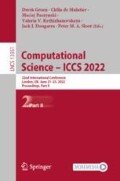Abstract
In textbooks, linear algebra expressions often use indices to specify the elements of variables. This index form expressions cannot be directly translated into efficient code, since optimized linear algebra libraries and frameworks require expressions in index-free form. To address this problem, we developed Lina, a tool that automatically converts linear algebra expressions with indices into index-free linear algebra expressions that we map efficiently to NumPy and Eigen code.
Access this chapter
Tax calculation will be finalised at checkout
Purchases are for personal use only
References
Ascher, D., Dubois, P.F., Hinsen, K., Hugunin, J., Oliphant, T., et al.: Numerical Python (2001)
Barthels, H., Psarras, C., Bientinesi, P.: Linnea: automatic generation of efficient linear algebra programs. ACM Trans. Math. Softw. 47(3), 1–26 (2021)
Baumgartner, G., et al.: Synthesis of high-performance parallel programs for a class of ab initio quantum chemistry models. Proc. IEEE 93(2), 276–292 (2005)
Bilmes, J.A., Asanovic, K., Chin, C., Demmel, J.: Author retrospective for optimizing matrix multiply using PHiPAC: a portable high-performance ANSI C coding methodology. In: ACM International Conference on Supercomputing 25th Anniversary Volume. ACM (2014)
Buitinck, L., et al.: API design for machine learning software: experiences from the Scikit-learn project. In: ECML PKDD Workshop (2013)
Cai, X., Langtangen, H.P., Moe, H.: On the performance of the python programming language for serial and parallel scientific computations. Sci. Program. 13(1) (2005)
Franchetti, F., et al.: SPIRAL: extreme performance portability. Proc. IEEE 106(11), 1935–1968 (2018)
Guennebaud, G., Jacob, B., et al.: Eigen v3. http://eigen.tuxfamily.org (2010)
Harris, C.R., et al.: Array programming with NumPy. Nature 585(7825), 357–362 (2020)
The Mathworks Inc, Natick, Massachusetts: MATLAB version R2021a (2021)
Matthews, D.A.: High-performance tensor contraction without transposition. SIAM J. Sci. Comput. 40(1), C1–C24 (2018)
Nuzman, D., et al.: Vapor SIMD: auto-vectorize once, run everywhere. In: Proceedings of the CGO 2011. IEEE Computer Society (2011)
Owen, A.B.: A robust hybrid of lasso and ridge regression. Contemp. Math. 443(7), 59–72 (2007)
Psarras, C., Barthels, H., Bientinesi, P.: The linear algebra mapping problem. arXiv preprint arXiv:1911.09421 (2019)
Sethi, R., Ullman, J.D.: The generation of optimal code for arithmetic expressions. J. ACM 17(4), 715–728 (1970)
Spampinato, D.G., Fabregat-Traver, D., Bientinesi, P., Püschel, M.: Program generation for small-scale linear algebra applications. In: Proceedings of the 2018 International Symposium on Code Generation and Optimization. ACM (2018)
Vasilache, N., et al.: Tensor comprehensions: framework-agnostic high-performance machine learning abstractions. CoRR abs/1802.04730 (2018)
Acknowledgements
This work was supported by the Carl Zeiss Foundation within the project Interactive Inference and from the Ministry for Economics, Sciences and Digital Society of Thuringia (TMWWDG), under the framework of the Landesprogramm ProDigital (DigLeben-5575/10-9).
Author information
Authors and Affiliations
Corresponding author
Editor information
Editors and Affiliations
Rights and permissions
Copyright information
© 2022 The Author(s), under exclusive license to Springer Nature Switzerland AG
About this paper
Cite this paper
Klaus, J., Blacher, M., Giesen, J., Rump, P.G., Wiedom, K. (2022). Compiling Linear Algebra Expressions into Efficient Code. In: Groen, D., de Mulatier, C., Paszynski, M., Krzhizhanovskaya, V.V., Dongarra, J.J., Sloot, P.M.A. (eds) Computational Science – ICCS 2022. ICCS 2022. Lecture Notes in Computer Science, vol 13351. Springer, Cham. https://doi.org/10.1007/978-3-031-08754-7_2
Download citation
DOI: https://doi.org/10.1007/978-3-031-08754-7_2
Published:
Publisher Name: Springer, Cham
Print ISBN: 978-3-031-08753-0
Online ISBN: 978-3-031-08754-7
eBook Packages: Computer ScienceComputer Science (R0)

